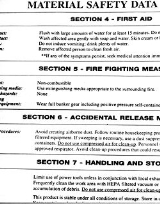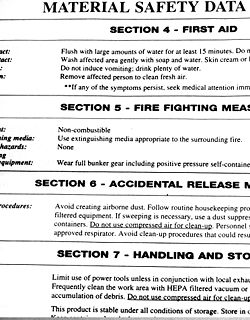
Store manager
Encyclopedia
A store manager is the person ultimately responsible for the day-to-day operations (or management
) of a retail store
. All employees
working in the store report to the store manager. A store manager reports to a district or general manager.
. The manager may also receive a monetary incentive
(or "bonus") tied to financial performance over a specific period. This incentive may be based on net sales, profitability
, or both. Thus, the store manager may be forced to reduce payroll
expenditures by decreasing employees' hours, or otherwise reducing operating cost
. A store Manager should Motivate his team to achieve the target set for the store by Using some different activities. A store manager should set an example for his/her subordinates to follow.
 The Store manager is the store's primary key-holder and may be called to the store before, during, or after business hours in the event of an emergency. They are also responsible for the safety of all customers and employees on store premises. Store managers may be required to hold safety meetings, especially as dictated by union
The Store manager is the store's primary key-holder and may be called to the store before, during, or after business hours in the event of an emergency. They are also responsible for the safety of all customers and employees on store premises. Store managers may be required to hold safety meetings, especially as dictated by union
practices in cases where store employees belong to a union.
who have management-level responsibility. These employees may be called assistant managers, department managers, supervisors, keyholders, shift leads, or leads.
A store manager has over-all responsibility for all day to day activity of the store. Managing & controlling staff, and planning are essential points of the store manager.
employees from within and develop future leaders
, potentially for employment at other locations. The role of store managers with regards to the other employees varies from company to company and each respective company's operating methods but in general a store manager will be required to deal with and try to solve any issues adversely affecting an employee's work. This is done to prevent a drop in productivity and to make sure that the employee seeking help doesn't end up being a casualty of the necessary role of firing long-term inefficient workers.
 In retail locations, store managers are responsible for visual merchandising
In retail locations, store managers are responsible for visual merchandising
. Many companies communicate how to merchandise their stores using direction such as planogram
s to indicate product placement. While managers have a varying degree of autonomy in deviating from corporate direction, it is important to ensure that stores are compliant with the company's brand
image. Managers must ensure that the proper amount of inventory
is displayed for customers to purchase, by ensuring that shelves and racks remain stocked and that product is frequently rotated out of storage areas. Managers are also concerned with shrinkage, and must ensure that merchandising techniques and customer service skills minimize the possibility of product being stolen
.
Possible Salary for Visual Merchandiser Salaries
Management
Management in all business and organizational activities is the act of getting people together to accomplish desired goals and objectives using available resources efficiently and effectively...
) of a retail store
Retailing
Retail consists of the sale of physical goods or merchandise from a fixed location, such as a department store, boutique or kiosk, or by mail, in small or individual lots for direct consumption by the purchaser. Retailing may include subordinated services, such as delivery. Purchasers may be...
. All employees
Employment
Employment is a contract between two parties, one being the employer and the other being the employee. An employee may be defined as:- Employee :...
working in the store report to the store manager. A store manager reports to a district or general manager.
Roles and responsibilities
Responsibilities of a store manager may include:- Human Resources, specifically: recruiting, hiring, training and development, performance management, payroll, and schedule workplace scheduling
- Store business operationsBusiness operationsBusiness operations are those ongoing recurring activities involved in the running of a business for the purpose of producing value for the stakeholders...
, including managing profit and loss, facility management, safety and security, loss prevention (also called shrinkShrinkage (accounting)In financial accounting the term inventory shrinkage is the loss of products between point of manufacture or purchase from supplier and point of sale. The term shrink relates to the difference in the amount of margin or profit a retailer can obtain...
), and banking - Product management, including ordering, receiving, price changes, handling damaged products, and returns
- Team Development, facilitating staff learning and development
- Problem solving, handling unusual circumstances
Sales generation
A store manager must meet monthly , quarterly, or annual sales goals, depending on the company's fiscal cycle. This involves setting individual sales goals (quotas), holding contests for employees, or offering sales promotionsPromotion (marketing)
Promotion is one of the four elements of marketing mix . It is the communication link between sellers and buyers for the purpose of influencing, informing, or persuading a potential buyer's purchasing decision....
. The manager may also receive a monetary incentive
Incentive
In economics and sociology, an incentive is any factor that enables or motivates a particular course of action, or counts as a reason for preferring one choice to the alternatives. It is an expectation that encourages people to behave in a certain way...
(or "bonus") tied to financial performance over a specific period. This incentive may be based on net sales, profitability
Profit (accounting)
In accounting, profit can be considered to be the difference between the purchase price and the costs of bringing to market whatever it is that is accounted as an enterprise in terms of the component costs of delivered goods and/or services and any operating or other expenses.-Definition:There are...
, or both. Thus, the store manager may be forced to reduce payroll
Payroll
In a company, payroll is the sum of all financial records of salaries for an employee, wages, bonuses and deductions. In accounting, payroll refers to the amount paid to employees for services they provided during a certain period of time. Payroll plays a major role in a company for several reasons...
expenditures by decreasing employees' hours, or otherwise reducing operating cost
Cost
In production, research, retail, and accounting, a cost is the value of money that has been used up to produce something, and hence is not available for use anymore. In business, the cost may be one of acquisition, in which case the amount of money expended to acquire it is counted as cost. In this...
. A store Manager should Motivate his team to achieve the target set for the store by Using some different activities. A store manager should set an example for his/her subordinates to follow.
Safety and security

Trade union
A trade union, trades union or labor union is an organization of workers that have banded together to achieve common goals such as better working conditions. The trade union, through its leadership, bargains with the employer on behalf of union members and negotiates labour contracts with...
practices in cases where store employees belong to a union.
Division of responsibility
A store manager may have several subordinatesHierarchy
A hierarchy is an arrangement of items in which the items are represented as being "above," "below," or "at the same level as" one another...
who have management-level responsibility. These employees may be called assistant managers, department managers, supervisors, keyholders, shift leads, or leads.
A store manager has over-all responsibility for all day to day activity of the store. Managing & controlling staff, and planning are essential points of the store manager.
Hiring, training and development
The store manager is responsible for hiring, training, and in some cases, development, of employees. The manager must ensure staffing levels are adequate to effectively operate the store, and ensure employees receive training necessary for their job responsibilities. Managers may be responsible for developing employees so the company can promotePromotion (rank)
A promotion is the advancement of an employee's rank or position in an organizational hierarchy system. Promotion may be an employee's reward for good performance i.e. positive appraisal...
employees from within and develop future leaders
Leadership
Leadership has been described as the “process of social influence in which one person can enlist the aid and support of others in the accomplishment of a common task". Other in-depth definitions of leadership have also emerged.-Theories:...
, potentially for employment at other locations. The role of store managers with regards to the other employees varies from company to company and each respective company's operating methods but in general a store manager will be required to deal with and try to solve any issues adversely affecting an employee's work. This is done to prevent a drop in productivity and to make sure that the employee seeking help doesn't end up being a casualty of the necessary role of firing long-term inefficient workers.
Visual merchandising and inventory control

Visual merchandising
Visual merchandising is the activity and profession of developing floor plans and three-dimensional displays in order to maximise sales.Both goods or services can be displayed to highlight their features and benefits...
. Many companies communicate how to merchandise their stores using direction such as planogram
Planogram
A planogram is "a diagram or model that indicates the placement of retail products on shelves in order to maximize sales".Also known as plano-grams, plan-o-grams, schematics and POGs, planograms are a tool used in visual merchandising.-Overview:A planogram is often received before a product reaches...
s to indicate product placement. While managers have a varying degree of autonomy in deviating from corporate direction, it is important to ensure that stores are compliant with the company's brand
Brand
The American Marketing Association defines a brand as a "Name, term, design, symbol, or any other feature that identifies one seller's good or service as distinct from those of other sellers."...
image. Managers must ensure that the proper amount of inventory
Inventory
Inventory means a list compiled for some formal purpose, such as the details of an estate going to probate, or the contents of a house let furnished. This remains the prime meaning in British English...
is displayed for customers to purchase, by ensuring that shelves and racks remain stocked and that product is frequently rotated out of storage areas. Managers are also concerned with shrinkage, and must ensure that merchandising techniques and customer service skills minimize the possibility of product being stolen
Theft
In common usage, theft is the illegal taking of another person's property without that person's permission or consent. The word is also used as an informal shorthand term for some crimes against property, such as burglary, embezzlement, larceny, looting, robbery, shoplifting and fraud...
.
Possible Salary for Visual Merchandiser Salaries
See also
- List of management topics
- List of marketing topics
- ShopkeeperShopkeeperA shopkeeper is an individual who owns a shop. Generally, shop employees are not shopkeepers, but are often incorrectly referred to as shopkeepers. Today, a shopkeeper is usually referred to as a manager, though this term could apply to larger firms .*In many south asian languages like Hindi, Urdu,...

